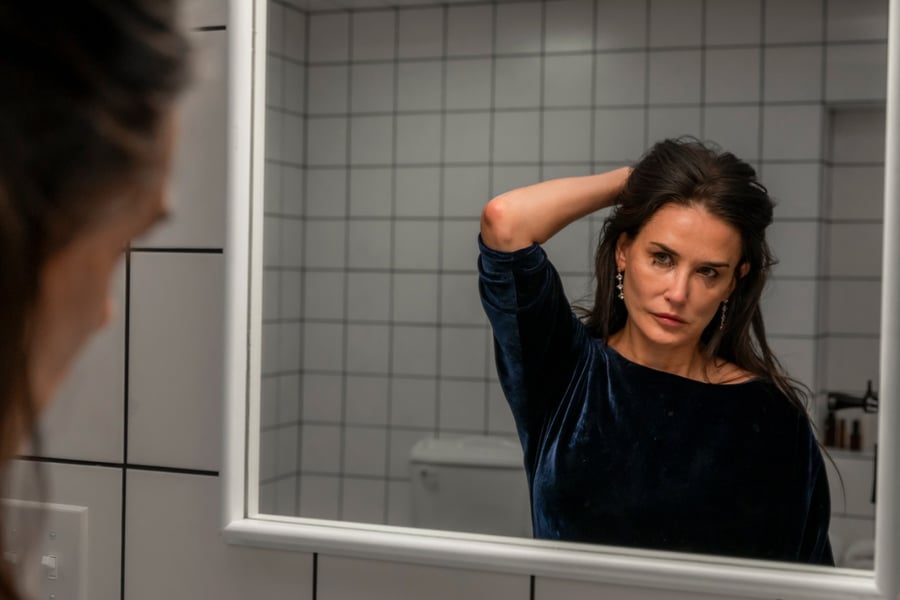Once upon a time in Hollywood, Elisabeth Sparkle (Demi Moore) was a star whose Walk of Fame plaque was a prime tourist attraction and nonstop selfie backdrop. Now, Sparkle hosts a fitness morning show that carbon-dates back to the 1990s. Her odious, sexist boss, Harvey (Dennis Quaid) — we’re sure the name has no real-world significance or symbolic import at all, nope, no siree Bob — has handed Elisabeth her walking papers so he can recast the a.m. slot with some younger, hotter model. A gorgeous woman in the City of Angels has the world groveling at her pedicured feet in her twenties. In her fifties, she’s invisible.
Coralie Fargeat’s The Substance takes this painful stop in the celebrity life cycle as a given, though the target of her brilliant body-horror satire isn’t just the game that prizes youth and beauty over all — it’s also trained its crosshairs, unfairly or not, on the players who will go to any length to stay in it. Sparkle is plummeting fast toward a professional rock bottom when a dewy-skinned youngster slips her a phone number, a flash drive, and a note that reads “It changed my life.” That “it” is a rejuvenation regimen known only as “the Substance,” which promises a whole new you. Sparkle signs up out of desperation. What she doesn’t realize is that it will literally produce a whole new her — a twentysomething version of herself (Margaret Qualley) that bursts fully formed out of Elisabeth 1.0’s back.
A French director whose previous movie, Revenge (2017), laced a feminist vengeance thriller with fanged, eat-the-rich class commentary, Fargeat has a knack for taking outrageous, grindhouse-friendly fodder and using it to toy with real-world toxicity. It’s not surprising that this drop-dead Elisabeth 2.0, who’s dubbed herself Sue, turns every man she meets into that tongue-lolling wolf from the Tex Avery cartoons; the movie adopts the leering male gaze to the point that every ogling shot of Qualley’s curves make you feel complicit in all the predatory behavior on display. Nor is it a shock when this walking, talking thirst trap takes full advantage of the opportunities she’s snatching away from the original Sparkle. Never underestimate how the balance of power tips when the base instincts of dumb, horny dudes come into play.
What is a shock is the gleeful way The Substance takes that graphic “birth” scene, which is already pitched at Cronenbergian levels of ickiness, and keeps doubling down on the body horror as things go off the rails. It’s established early on that, while the two Sparkles don’t share a consciousness, they are still the same person. (“There’s no ‘she’ and ‘you,’ ” the faceless liaison on the helpline keeps intoning. “You are ‘one.’) In addition to strict adherence to a plan involving intravenous feeding bags and daily “stabilizer” injections, both Sparkles must also trade places every seven days. Failure to do so will… well, let’s just say it’ll get ugly. And when Sue starts extending her time after landing the primo gig of hosting her network’s live New Year’s Eve show … man, does it ever get ugly.
Once the movie turns into a standoff between the Sparkles, and Fargeat gives her actors a syrup-soaked stage on which to rage — if Moore’s extraordinary, best-of-career performance doesn’t kick off a full Demi-aissance, there is no God — this riff on The Picture of Dorian Gray goes ballistic in the best possible way. You want a climactic bloodbath that puts The Shining‘s plasma-gushing elevator to shame? You got it! Not even certain story-logic lapses (so if the older Sparkle can’t directly share the younger’s indulgences, what exactly is she getting out of this?) suck away the thrill of seeing these women tear impossible beauty standards a new one. The Substance won’t reset society’s fixation on youth or cure Hollywood’s sexist ills. It will, however, remind you that when you’re chasing your past by any means necessary, you are always your own worst enemy.
From Rolling Stone US
Love Music?
Get your daily dose of everything happening in Australian/New Zealand music and globally.



































